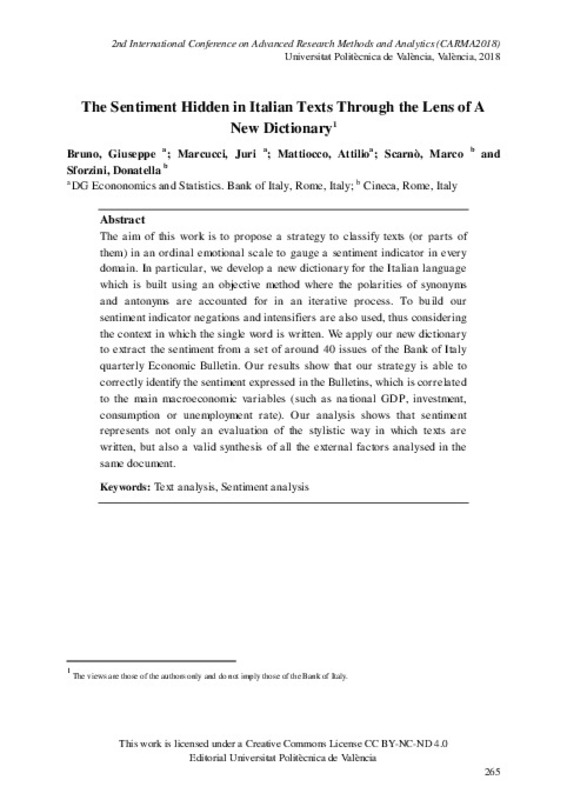JavaScript is disabled for your browser. Some features of this site may not work without it.
Buscar en RiuNet
Listar
Mi cuenta
Estadísticas
Ayuda RiuNet
Admin. UPV
The Sentiment Hidden in Italian Texts Through the Lens of A New Dictionary
Mostrar el registro sencillo del ítem
Ficheros en el ítem
| dc.contributor.author | Bruno, Giuseppe
|
es_ES |
| dc.contributor.author | Marcucci, Juri
|
es_ES |
| dc.contributor.author | Mattiocco, Attilio
|
es_ES |
| dc.contributor.author | Scarnò, Marco
|
es_ES |
| dc.contributor.author | Sforzini, Donatella
|
es_ES |
| dc.date.accessioned | 2018-11-06T07:36:11Z | |
| dc.date.available | 2018-11-06T07:36:11Z | |
| dc.date.issued | 2018-09-07 | |
| dc.identifier.isbn | 9788490486894 | |
| dc.identifier.uri | http://hdl.handle.net/10251/111926 | |
| dc.description | Resumen de la comunicación | es_ES |
| dc.description.abstract | [EN] The aim of this work is to propose a strategy to classify texts (or parts of them) in an ordinal emotional scale to gauge a sentiment indicator in every domain. In particular, we develop a new dictionary for the Italian language which is built using an objective method where the polarities of synonyms and antonyms are accounted for in an iterative process. To build our sentiment indicator negations and intensifiers are also used, thus considering the context in which the single word is written. We apply our new dictionary to extract the sentiment from a set of around 40 issues of the Bank of Italy quarterly Economic Bulletin. Our results show that our strategy is able to correctly identify the sentiment expressed in the Bulletins, which is correlated to the main macroeconomic variables (such as national GDP, investment, consumption or unemployment rate). Our analysis shows that sentiment represents not only an evaluation of the stylistic way in which texts are written, but also a valid synthesis of all the external factors analysed in the same document. | es_ES |
| dc.format.extent | 1 | es_ES |
| dc.language | Inglés | es_ES |
| dc.publisher | Editorial Universitat Politècnica de València | es_ES |
| dc.relation.ispartof | 2nd International Conference on Advanced Reserach Methods and Analytics (CARMA 2018) | es_ES |
| dc.rights | Reconocimiento - No comercial - Sin obra derivada (by-nc-nd) | es_ES |
| dc.subject | Web data | es_ES |
| dc.subject | Internet data | es_ES |
| dc.subject | Big data | es_ES |
| dc.subject | QCA | es_ES |
| dc.subject | PLS | es_ES |
| dc.subject | SEM | es_ES |
| dc.subject | Conference | es_ES |
| dc.subject | Text analysis | es_ES |
| dc.subject | Sentiment analysis | es_ES |
| dc.title | The Sentiment Hidden in Italian Texts Through the Lens of A New Dictionary | es_ES |
| dc.type | Capítulo de libro | es_ES |
| dc.type | Comunicación en congreso | es_ES |
| dc.identifier.doi | 10.4995/CARMA2018.2018.8580 | |
| dc.rights.accessRights | Abierto | es_ES |
| dc.description.bibliographicCitation | Bruno, G.; Marcucci, J.; Mattiocco, A.; Scarnò, M.; Sforzini, D. (2018). The Sentiment Hidden in Italian Texts Through the Lens of A New Dictionary. En 2nd International Conference on Advanced Reserach Methods and Analytics (CARMA 2018). Editorial Universitat Politècnica de València. 265-265. https://doi.org/10.4995/CARMA2018.2018.8580 | es_ES |
| dc.description.accrualMethod | OCS | es_ES |
| dc.relation.conferencename | CARMA 2018 - 2nd International Conference on Advanced Research Methods and Analytics | es_ES |
| dc.relation.conferencedate | Julio 12-13,2018 | es_ES |
| dc.relation.conferenceplace | Valencia, Spain | es_ES |
| dc.relation.publisherversion | http://ocs.editorial.upv.es/index.php/CARMA/CARMA2018/paper/view/8580 | es_ES |
| dc.description.upvformatpinicio | 265 | es_ES |
| dc.description.upvformatpfin | 265 | es_ES |
| dc.type.version | info:eu-repo/semantics/publishedVersion | es_ES |
| dc.relation.pasarela | OCS\8580 | es_ES |








